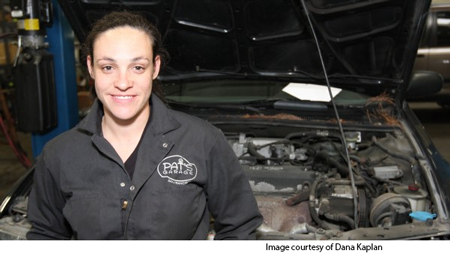Most of our talk about women’s career advancement seems to focus on elite colleges and high profile professions such as corporate leadership. Yet there are many jobs open to women who want to try less obvious routes to career success.
AAUW has long been a leader in workplace advancement and pay equity for women.Their recent research into the higher student loan debt burden women experience due to the gender pay gap found that many women – more than 4 million – view community college as their best, and most affordable, option after high school. Here is AAUW’s full hot-off-the-press report on women in community colleges.
Dana Kaplan’s story of how she succeeded in a typically all-male field is a fascinating example of how community colleges can help women change careers or to gain the skills they need to advance in any chosen profession.
If at first you don’t succeed, try, try again.
Like a lot of recent graduates, Kaplan had trouble getting work in her chosen field — philosophy — after college. She realized she needed a change when she found herself stuck “9 to 5 in a cubicle. I couldn’t stand it.”Or, if you’re an auto mechanic and 2011–12 AAUW Career Development Grantee Dana Kaplan, try something completely different!
I asked Kaplan how she made the jump from one career to the next. “I always knew I wanted to work with my hands,” she said. For a while she considered going into construction, to which people generally responded, “You’re too smart; you’re too pretty [for a job like that].”
When she ran into car trouble a few years ago, Kaplan decided to learn how to fix it. She enrolled in an auto repair class at Skyline College, a community college in the San Francisco Bay Area. That’s where she met a female automotive training teacher who suggested that Kaplan pursue the three-year program for auto mechanic certification. From there, she says, “I left it up to fate. [I thought] I would just apply, and if I get in I’ll do it, and if I get a job then this is what I’ll do. And I got a job!”
When it came time to pay for the program, Kaplan applied to AAUW for support. The Career Development Grant “helped me continue on my career path and change it. If I hadn’t gotten the grant I wouldn’t have been able to continue to go to school. I was also able to buy tools that I needed for the program.”
Kaplan had no illusions that changing her career path would be easy, particularly as a woman pursuing a traditionally male-dominated field. Despite the challenge, she urges anyone considering nontraditional fields to try. “Go for it. Take the risk. Better to try than to never have tried. Know that it will be work, but it’s worth it. I came in not knowing anything and I had to play catch-up.” Kaplan explained that in her own field and for nontraditional roles in general, “Men are, from [the time they are] kids, tailored to go into it,” and the same is true for men pursuing traditionally female-dominated fields. “So there’s always catch-up. But if you really want it and are willing to work, then it’s an amazing opportunity.”
So Kaplan worked hard, played catch-up, and found a supportive community within the auto department at Skyline. “There have always been a handful of females in the automotive program. … So we thought, Let’s start a club. It became this great idea: make female presence known in the automotive industry.” The club wasHeart Wrenchers, a student organization that runs community service projects, supports women currently in the automotive program, and aims to bring more women into the industry. “They’re still on campus,” Kaplan added.
Kaplan’s story mirrors that of other women who enroll in community college to improve their job skills or to retrain for a new career but who also encounter challenges in pursuing a nontraditional field. This is one of the issues examined in AAUW’s upcoming research report, Women in Community Colleges: Access to Success.
Today, people will occasionally ask whether Kaplan “can do everything the guys can do,” or if she is willing to get her hands dirty. But Kaplan, who now works as a mechanic in San Francisco, feels confident. “It’s a lot of physical effort, but there are a lot of guys that are the same size as me in the industry. So it isn’t a problem. I get positive feedback. People like seeing me in the shop.”
Six California endowments sponsored Dana Kaplan’s grant: San Carlos (CA) Branch 50th Jubilee, Pleasant Hill (CA) Branch, Novato (CA) Branch, Menlo-Atherton (CA) Branch 35th Anniversary, Davis (CA) Branch 20th Anniversary, and Jan Barnhardt/Gladys Betts/San Bruno (CA) Branch Research and Project Grants.
This post was written by AAUW Fellowships and Grants Intern Lauren Byrnes and reprinted here by permission of AAUW.
Gloria Feldt
Latest posts by Gloria Feldt (Posts)
- This Blog is No Longer Active… - March 17, 2014
- Women’s Equality Day and the Civil Rights March - August 26, 2013
- Stuck? Change Your Relationship With Power - July 21, 2013






 "Female Writers Kicking Up Literary Dust"
"Female Writers Kicking Up Literary Dust"